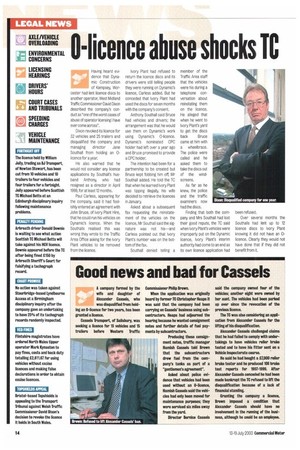Good news and bad for Cassels
Page 16

If you've noticed an error in this article please click here to report it so we can fix it.
A company formed by the wife and daughter of Alexander Cassels, who was disqualified from holding an 0-licence for two years. has been granted a licence.
Cassels Transport, of Salisbury, was seeking a licence for 15 vehicles and 15 trailers before Western Traffic Commissioner Philip Brown.
When the application was originally heard by former TC Christopher Heaps it was said that the company had been carrying on Cassels' business using subcontractors. Heaps had adjourned the hearing because he wanted consignment notes and further details of fuel payments by subcontractors.
Producing these consignment notes, traffic manager Hamish Cassels told Brown that the subcontractors drew fuel from the company's tanks as part of a "gentlemen's agreement".
Asked about police evidence that vehicles had been used without an 0-licence, Hamish Cassels said the vehicles had only been moved for maintenance purposes; they were serviced six miles away from the yard.
Director Bernice Cassels said the company owned four of the vehicles; another eight were owned by her aunt. The vehicles had been parked up ever since the revocation of the previous licence.
The TC was also considering an application from Alexander Cassels for the lifting of his disqualification.
Alexander Cassels challenged claims that he had failed to comply with undertakings to have vehicles roller brake tested and to have his fitter sent on a Vehicle Inspectorate course.
He said he had bought a 11,000 roller brake tester and he produced 108 brake test reports for 1997-1999. After Alexander Cassols conceded he had been made bankrupt the TC refused to lift the disqualification because of a lack of financial standing.
Granting the company a licence, Brown imposed a condition that Alexander Cassels should have no involvement in the running of the business, although he could be an employee.




































































































